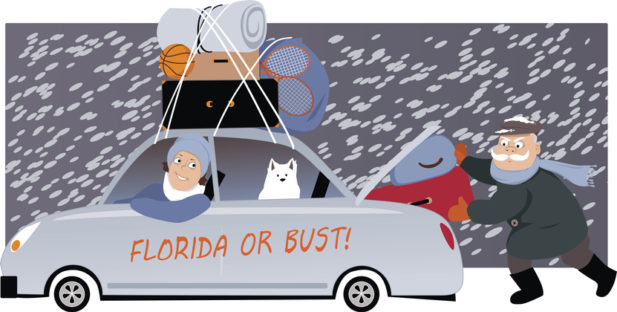Before You Head South: What Canadian “Snowbirds” Should Know About Car, Home, and Health Insurance

Each year, flocks of Canadian “snowbirds” head south to warmer parts of the U.S.A. and abroad to avoid the freezing temperatures at home. Before you travel, however, you should take a moment to review your car, home and health insurance to make sure that you are properly insured in the event something happens to you (or your car or home) while you are on vacation.
Car Insurance
If you have an Ontario car insurance policy and plan to drive your car south to a vacation in the U.S.A., your Canadian car insurance policy should cover you in the event that you become injured in a collision while on vacation. You can apply for accident benefits with your Ontario policy and, depending on your policy, may be eligible to receive funding from your car insurer. This funding may include funding for medical and rehabilitation expenses, attendant care expenses, housekeeping expenses. It may also include caregiving expenses or an income replacement benefit if your injuries prevent you from returning to work. If you are injured in a car accident while traveling in the U.S.A., an experienced personal injury lawyer in Ontario can help you.
If you are flying south and will be renting a car when you arrive in the U.S.A., your Ontario insurance policy should respond to your claim for accident benefits and should also provide you with coverage for injuries that you may have caused to others or property you damaged. Your car insurance may not automatically cover the cost of damage to the rental car. You can contact your insurance company to ensure that you are covered while driving your car or a rental car in the U.S.A. and you may be able to purchase an additional endorsement to cover the cost of damage to a rental car. You can also see if your credit card offers insurance that will cover property damage to a rental car.
You may need to purchase extra insurance if you will be gone or using a rental car for more than 30 days or if you are making your southern destination your exclusive place of residence in the winter.
Home Insurance
Home insurance policies in Ontario differentiate between homes that are “vacant” and homes that are “unoccupied”. Home insurance policies are not all the same and the definition of “vacancy” and “unoccupied” that applies to you will be included in your insurance policy.
The definition of “vacancy” in a policy usually applies to situations where the occupants of the house have moved out and the house is empty. The definition of “unoccupied” usually applies where you are away from home for 4 or more consecutive days. If your home is going to be unoccupied for a period of time, you need to arrange for someone to check in at your home (the frequency of required visits may be included in your insurance policy) and you should also drain your pipes and shut off your water supply to reduce the risk of flooding.
If damage occurs to your home while it is unoccupied and you have not complied with the requirements in your policy, your insurance may not cover you for certain types of losses, like flood damage caused by frozen pipes or appliances like dishwashers. Some policies will still cover your while your home is unoccupied, provided you make special arrangements to monitor the home while you are gone. If your home is vacant for 30 or more days and you have not advised your insurer of that fact, your entire insurance policy could be void.
Before you go on vacation, you should contact your insurance company or broker to confirm what you need to do to ensure that you will be covered if anything happens while you’re gone.
Health Insurance
It is always a good idea to obtain travel medical insurance before going on vacation to help protect you from huge and unexpected health expenses. Almost all health insurance policies have an exclusion clause stating that if you have a certain pre-existing health conditions which are not “stable” in the three months before the effective date of the policy, the policy becomes void. Definitions of medical stability are very strict and being referred to a specialist or changing your medication could be enough to trigger the exclusion. If you have pre-existing medical issues, you can still purchase health insurance but you must ensure that you answer all of the insurer’s questions truthfully and candidly so that your policy will cover you in the event of an unexpected health expense.
As with your car and home insurance, you should speak with your insurance company before going on vacation to confirm that you are covered for the duration of your trip.
About the Authors

As a partner at Oatley Vigmond, Lara Fitzgerald-Husek uses her empathy, creativity, and trial experience to connect with her clients and help them move forward after trauma. Lara focuses her practice solely on personal injury, and she is determined to get her clients the best possible outcome—the one they deserve.
